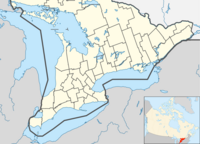Brockton, Ontario
Brockton | |
|---|---|
| Municipality of Brockton | |
 St. Michael Church remains, Brant | |
| Coordinates: 44°10′N 81°13′W / 44.167°N 81.217°W | |
| Country | Canada |
| Province | Ontario |
| County | Bruce |
| Settled | 1848 |
| Formed | January 1, 1999 |
| Government | |
| • Mayor | Chris Peabody |
| • Federal riding | Huron—Bruce |
| • Prov. riding | Huron—Bruce |
| Area | |
| • Land | 564.64 km2 (218.01 sq mi) |
| Population (2021)[1] | |
• Total | 9,784 |
| • Density | 17.3/km2 (45/sq mi) |
| Time zone | UTC−05:00 (EST) |
| • Summer (DST) | UTC−04:00 (EDT) |
| Postal Code FSA | N0G |
| Area code(s) | 519 and 226 |
| Website | www |
Brockton is a municipality in the Canadian province of Ontario, located in Bruce County. As of 2021[update], the population was 9,784.[1]
The current municipality was formed on January 1, 1999, by amalgamating the former township of Brant, former township of Greenock and the town of Walkerton. Brockton's name was formed as a portmanteau of the three merged municipalities (Brant Greenock Walkerton).
Communities
[edit]Communities in the Municipality of Brockton include the former town of Walkerton and the villages within the boundaries of the two former Brant and Greenock Townships: Bradley, Cargill, Chepstow, Dunkeld, Eden Grove, Glammis, Greenock, Little Egypt, Malcolm, Maple Hill, Narva, Marle Lake, Lake Rosalind, Pearl Lake, Pinkerton, Portal, Riversdale and Solway.
Demographics
[edit]In the 2021 Census of Population conducted by Statistics Canada, Brockton had a population of 9,784 living in 4,032 of its 4,406 total private dwellings, a change of 3.4% from its 2016 population of 9,461. With a land area of 564.64 km2 (218.01 sq mi), it had a population density of 17.3/km2 (44.9/sq mi) in 2021.[1]
| 2021 | 2016 | 2011 | |
|---|---|---|---|
| Population | 9,784 (+3.4% from 2016) | 9,461 (+0.3% from 2011) | 9,432 (-2.2% from 2006) |
| Land area | 564.64 km2 (218.01 sq mi) | 565.18 km2 (218.22 sq mi) | 565.41 km2 (218.31 sq mi) |
| Population density | 17.3/km2 (45/sq mi) | 16.7/km2 (43/sq mi) | 16.7/km2 (43/sq mi) |
| Median age | 44.8 (M: 43.6, F: 46.0) | 46.2 (M: 45.0, F: 47.5) | 45.0 (M: 44.4, F: 45.5) |
| Private dwellings | 4,406 (total) 4,032 (occupied) | 4,252 (total) | 4,157 (total) |
| Median household income | $84,000 | $67,597 |
| Year | Pop. | ±% |
|---|---|---|
| 2001 | 9,658 | — |
| 2006 | 9,641 | −0.2% |
| 2011 | 9,432 | −2.2% |
| 2016 | 9,461 | +0.3% |
| 2021 | 9,784 | +3.4% |
| Source: Statistics Canada[5] | ||
Population trend prior to amalgamation:
- Population total in 1996: 10,163
- Brant (township): 3,455
- Greenock (township): 1,672
- Walkerton (town): 5,036
- Population in 1991:
- Brant (township): 3,420
- Greenock (township): 1,741
- Walkerton (town): 4,939
Mother tongue (2021):[1]
- English as first language: 95.8%
- French as first language: 0.4%
- English and French as first language: 0.3%
- Other as first language: 3.0%
Government
[edit]List of former mayors:
- David Thomson (1999–2003)
- Charlie Bagnato (2003–2010)
- David Inglis (2010–2018)
- Chris Peabody (2018–present)
See also
[edit]References
[edit]- ^ a b c d e "Brockton, Ontario (Code 3541032) Census Profile". 2021 census. Government of Canada - Statistics Canada. Retrieved 2024-10-04.
- ^ "2021 Community Profiles". 2021 Canadian census. Statistics Canada. February 4, 2022. Retrieved 2023-10-19.
- ^ "2016 Community Profiles". 2016 Canadian census. Statistics Canada. August 12, 2021. Retrieved 2019-06-10.
- ^ "2011 Community Profiles". 2011 Canadian census. Statistics Canada. March 21, 2019. Retrieved 2012-08-09.
- ^ 1996, 2001, 2006 census
External links
[edit] Brockton, Ontario travel guide from Wikivoyage
Brockton, Ontario travel guide from Wikivoyage- Official website


